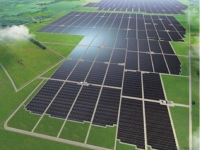 Blue Energy to develop Africa's largest PV projectDec 04, 2012 - Julia Chan - pv-tech.org
The Nzema plant will be built by Mere Power Nzema, a subsidiary of Blue Energy, on a 183-hectare site close to the village of Aiwiaso in Western Ghana. It has secured a 100-year lease on the site, planning permission and permission to connect to the grid. The site enjoys good solar radiation and has excellent access to the major road system. The plant will be directly connected to the 161kV West African Power Pool transmission line, which runs alongside the site, linking Ghana to Ivory Coast, Togo, Benin and Nigeria. The company is currently in negotiations with two potential EPC providers and has not yet selected the equipment suppliers. However, Coleman was able to confirm that the 155MW Nzema project will utilise around 630,000 polycrystalline 245w PV modules which will help to generate an estimated annual output of 240GWh. In addition to selecting an EPC provider, Blue Energy will now conclude discussions with a number of international financial institutions and global equity and infrastructure funds, which have expressed interest in providing debt financing or investing in the project. It expects to reach financial close in the first half of 2013. Construction is scheduled to begin in the fourth quarter of 2013 and sections will come online as they are completed. It is expected to be fully operational by October 2015. During the construction phase, it will create 500 jobs over the two-year construction period as well as 200 permanent jobs when it is operational. It is also expected to stimulate another 2,100 jobs in the local economy, by sub-contracting activities to local companies and increasing demand for goods, services and education. When complete, the project will increase Ghana’s current installed electricity capacity by 6%. It will also meet 20% of the government’s to generate 10% of its electricity from renewable sources by 2020. Commenting on the impact of the project, Chris Dean, CEO of Blue Energy, said: “Ghana’s forward-thinking strategy puts it in a strong position to lead the renewable energy revolution in sub-Saharan Africa. Nzema is a case study in how governments can unlock the huge potential for solar energy in Africa. We are delighted that it will make a strong contribution to the national economy, provide much needed generating capacity and help develop the skills of the future. There’s huge potential to develop renewable power in the region. We believe Nzema will show other countries what can be achieved and spur them to action.” The company began working on the development plans for the project in 2010 and faced several challenges during this phase. However, much of these challenges were solved by the launch of the 2011 Renewable Energy Act in November 2011 which was key to bringing the project forward, Coleman revealed to PV-Tech. Coleman described the Act as an “elegant, transparent and open regulatory framework” that will play a crucial role in helping the government to double its installed capacity, from 2600MW to 5,500MW by 2015. The Nzema project will be the first to go ahead under Ghana’s 2011 Renewable Energy Act, which offers feed-in tariffs and seeks to attract international finance. In November, Ghana’s Energy Minister Joe Oteng-Adjei announced he was seeking US$1 billion of private investment to help Ghana achieve its renewables target. Ghana is one of the fastest growing economies in sub-Saharan Africa, with 14.4% gross domestic product (GDP) growth in 2011. Demand for power is growing at 10-15% a year, but a lack of reliable generating capacity has acted as a brake on the economy. Power shortages are estimated to have cost 1.9% of GDP in 2006. Much of Ghana’s electricity is hydroelectric, but this is vulnerable to drought, and the country is increasingly reliant on expensive oil generation. The project represents Blue Energy’s first international project and it has several additional PV projects in the pipeline in West Africa but no further details were unveiled. Coleman also revealed that the company may also consider entering the South Africa solar market, which has seen a surge in PV activity in recent months. Africa offers rich sources for renewable energy, especially for solar. However, many of the proposed African projects have failed to come to fruition for reasons including unsupportive regulatory environments, energy underpricing, a lack of technical capacity and a weak supply chain. It is believed that Ghana’s Renewable Energy Act will be key to helping the country to develop skills, an improved infrastructure, and government and regulatory experience to support other PV projects in throughout the continent. |
 The 155MW project will represent Africa's largest PV project as well as Ghana's
first grid-connected PV project. Image: Blue
Energy.
The 155MW project will represent Africa's largest PV project as well as Ghana's
first grid-connected PV project. Image: Blue
Energy.